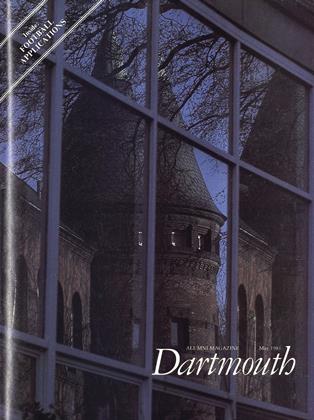POLLS: Their Use and Misuse in Politics by Charles W. Roll and Albert H. Cantril '62 Seven Locks Press, 1980. 177 pp. $5.95
POLLING ON THE ISSUES Edited by Albert H. Cantril '62 Seven Locks Press, 1980. 224 pp. $10.95, $6.95 paperback
By reporting and analyzing public attitudes and preferences, public opinion polling often creates, sustains, or shapes those very attitudes and desires. Polling itself has therefore become a political issue. Some 15 or 20 years ago, as the science and craft of polling began to become a more widely recognized — and a more widely used and abused - technique, the influence of polling on the American political process first became a matter of controversy. Widespread debate occurred among professional pollsters, their customers, and the informed public as to the rightful place of polling in a democracy. But interest in polling goes in and out of fashion.
Although today it seems far less widely discussed than it used to be, many technological changes, a greater technical sophistication, and a significant expansion of the use of polls make the issue of polling just as important as it was a decade ago. In order to participate in the debate, however, the general public must have accessible reliable information about polling as a science and a craft.
Cantril and Roll provide such information. Polls: Their Use and Misuse in Politics presents the clearest and most lucid explanation of polling that I have seen. First published in 1972, the book has now been revised and reissued in a paperback version and has been updated by the addition of a 30-page discussion of recent adances in polling techniques.
Cantril and Roll open the book with an interesting discussion of what they call "the unfortunate use of polls" in political affairs. The results of polls, they point out, can be attractive to those who wish to rationalize their own political positions. Lyndon Johnson, for example, was especially sensitive to the political power of polls and used them to justify a course of action that he wanted to take or to avoid taking. In the hands of some politicians polls tend to be used for self-justification, and the information derived from them is manipulated for political ends.
But Cantril and Roll also point out and analyze the many legitimate and reasonable uses of polling information in the area of politics. They also discuss the more technical question of what it is that makes a poll reliable, pointing out that there are, after all, different kinds of polls and that such considerations as the number and variety of the questions asked by the pollster have a direct effect on the reliability and validity of each poll. They conclude their book with a general discussion of the legitimate place of polling in a free society.
Polling on the Issues affords further evidence that the professional poll-takers are well aware of the national importance of what they are doing. In 1979, a conference sponsored by the Kettering Foundation brought together the nation's, leading pollsters, their customers, and the academic evaluators of their techniques and their product. Polling on the Issues is Cantril's edited proceedings of that conference. It contains 11 reports, each by a recognized expert in the field, several comments on those reports by other professionals, and the edited transcript of a roundtable discussion among the participants in the conference.
Almost no issue raised by contemporary refinements in polling technique or by the widespread use and misuse of polling results is left untouched in the reports and discussion of the conferees. As polls become increasingly reliable, for instance, and as the cost of conducting polls decreases, TV networks and newspapers have created their own polling staffs. What, then, are the potential implications of this newly formed link between journalism and polling? Is it possible that the scientific, statistical reliability of a poll as a means of discovering mass opinion in a democracy might be sacrificed to the pressures of time and topicality felt by the press? The experts do not have all the answers, but they do introduce most of the important political and social implications of polls and poll-taking in Cantril's well edited and very readable collection of reports and discussions.
Richard Winters is associate professor ofgovernment.
 View Full Issue
View Full Issue
More From This Issue
-
 Feature
FeatureTelling Another's Tale
May 1981 By Gregory Rabassa -
 Feature
FeatureThe Last of the Liberals?
May 1981 By Frank B. Wilderson -
 Feature
FeatureOnce King and Future President
May 1981 By David Shribman -
 Article
ArticleMind for Adventure
May 1981 By Don Rosenthal '81 -
 Article
ArticleGreat Issues, Etc.
May 1981 -
 Sports
SportsThe Club Set
May 1981 By Brad Hills '65
Books
-
 Books
BooksAlumni Publications
June 1934 -
 Books
BooksAlumni Articles
December 1945 -
 Books
BooksETHICS IN A WORLD OF POWER: THE POLITICAL IDEAS OF FRIEDRICH MEINECKE
MARCH 1959 By ARTHUR M. WILSON -
 Books
BooksFINANCIAL POLICY IN A CHANGING ECONOMY.
FEBRUARY 1971 By COLIN D. CAMPBELL -
 Books
BooksFaculty Books
January 1953 By JUDSON S. LYON '40 -
 Books
BooksTHE ODES OF PINDAR,
April 1947 By Royal Case Nemiah


